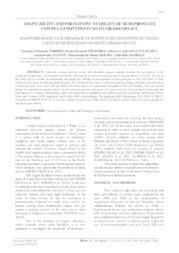Adaptability and phenotypic stability of semi-prostate cowpea genotypes in Mato Grosso do Sul.
Adaptability and phenotypic stability of semi-prostate cowpea genotypes in Mato Grosso do Sul.
Autoria: TORRES, F. E.; TEODORO, P. E.; CARGNELUTTI FILHO, A.; SANTOS, A. dos; ROCHA, M. de M.; SAGRILO, E.
Resumo: Currently, cowpea growing covers three Brazilian regions, making essential the investigation of the magnitude of genotype x environment essential for choosing the best selection strategy and recommendation of cultivars. The aim of this study was to evaluate the adaptability and phenotypic stability of semi-prostate cowpea genotypes in sites from State of Mato Grosso do Sul based on different methodologies. We conducted four value of cultivation and use testing with lines and cultivars of cowpea genotypes in the years 2005 and 2006 in the municipalities of Aquidauana, Chapadão do Sul and Dourados. The experimental design was randomized complete block with 20 treatments and four replications. The grain yield data were submitted to individual and joint analysis of variance. Subsequently, data were submitted to adaptability and stability analysis by Eberhart and Russell (1966), Yates and Cochran (1938) (traditional) and Wricke (1965) methodologies. The genotypes BRS Xiquexique, TE97-304G-12, BR 17- Gurguéia and MNC99-541F-15 are the most suitable for growing in Mato Grosso do Sul by combine high yield grain, adaptability and phenotypic stability.
Ano de publicação: 2016
Tipo de publicação: Artigo de periódico
Unidade: Embrapa Meio-Norte
Palavras-chave: Genótipo x ambiente, Rendimento de grãos, Vigna Unguiculata
Observações
1 - Por padrão são exibidas publicações dos últimos 20 anos. Para encontrar publicações mais antigas, configure o filtro ano de publicação, colocando o ano a partir do qual você deseja encontrar publicações. O filtro está na coluna da esquerda na busca acima.
2 - Para ler algumas publicações da Embrapa (apenas as que estão em formato ePub), é necessário ter, no celular ou computador, um desses softwares gratuitos. Sistemas Android: Google Play Livros; IOS: iBooks; Windows e Linux: software Calibre.
Acesse outras publicações
Acesse a Base de Dados da Pesquisa Agropecuária (BDPA) para consultar o acervo completo das bibliotecas da Embrapa.

